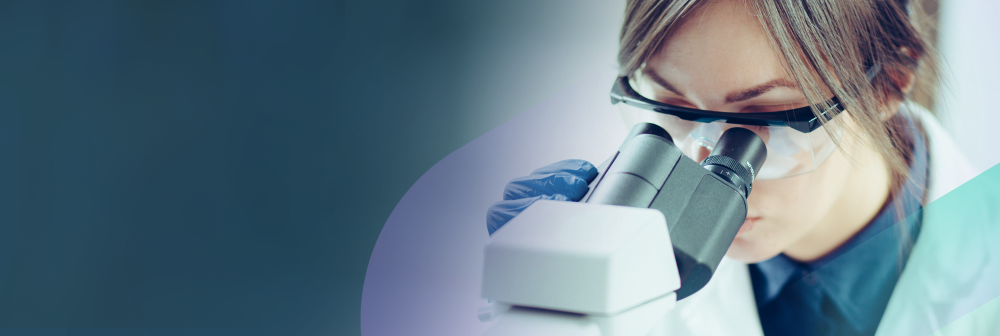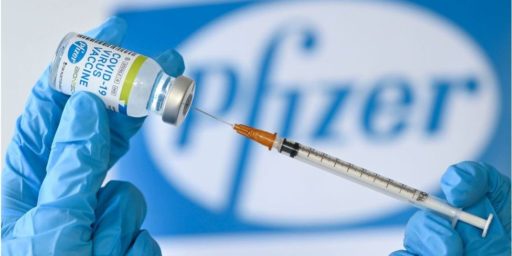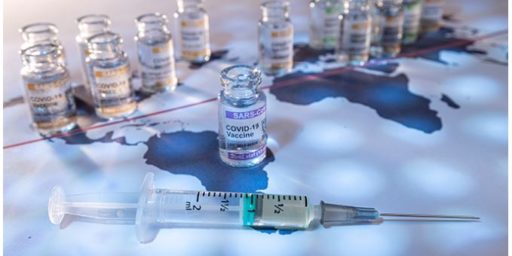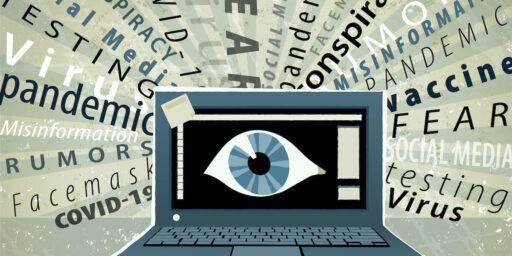Everyone’s a Virologist Now
Is media coverage of experts' struggles to understand COVID helpful?

One meta thread running through a lot of our COVID discussions here is the futility of people like us trying to understand the rapidly-evolving science that even the specialists are still struggling to figure out. A case in point is a piece in the Atlantic by Rachel Gutman, who has a bachelor’s in comparative literature from Brown, titled “Is Moderna Really Better Than Pfizer—Or Is It Just a Higher Dose?”
Way back in February, when COVID-19 vaccines were still largely restricted to the most vulnerable among us, public-health leaders were determined to send a unified message: Don’t worry about the differences among the vaccines. “All three of them are really quite good, and people should take the one that’s most available to them,” Anthony Fauci said on Meet the Press.
Now that hundreds of millions of vaccine doses have been distributed in the United States, we have plenty of reason to doubt that story. A recent (but not yet peer-reviewed) study of more than half a million U.S. veterans showed that the Johnson & Johnson shot’s protection against infection (whether or not that leads to disease or hospitalization) had plummeted from 88 percent to 3 percent by mid-August, while the other vaccines’ effectiveness had declined much less. Research published in the past few months also signals that Moderna’s shot beats out Pfizer’s in terms of both antibody count and hospitalizations prevented, while a National Institutes of Health study released earlier this month found that Moderna’s booster shot lifted participants’ antibody levels a bit more than Pfizer’s, and that both mRNA boosters were miles ahead of J&J’s.
So, first off, there’s no contradiction here. The priority in the late winter and spring of this year was simply to get as many people vaccinated as humanly possible. There was only so much vaccine to go around, distribution was chaotic, and doses were incredibly perishable. So, “Get whatever vaccine you can get as fast as you can get it” was absolutely the right advice.
Because we both work for the Department of the Navy and Defense Department employees had high priority for vaccination, my wife and I both got our first doses in March. Because DON, at least in the National Capitol Region, had Moderna in March, that’s what we got. When shots opened up for 16-21-year-olds later in the spring, our three oldest got their shots. And when they opened up for 12-15-year-olds in June, my 12-year-old got hers. Since Pfizer was the only vaccine approved for those age groups, all of the kids got that one.
As best as I can glean through all of the reporting, both Moderna and Pfizer are excellent at doing what they’re supposed to do: preventing getting sick with COVID-19 and mitigating the severity of the symptoms if we do get it. But, yes, Moderna seems to be somewhat better based on the early evidence.
In light of all these data, it’s tempting to rank the vaccines by brand name: Moderna is better than Pfizer is better than J&J. But the same numbers hint at a different pattern: Maybe what matters most is not which vaccine you get, but how much of it.
Consider how the vaccines differ in their dosing. J&J, the least effective in the studies, has only one shot in its primary series; the mRNA vaccines have two. So anyone who got J&J (and hasn’t yet gotten a booster) received half as many doses total. Comparing Pfizer with Moderna, you see another dose difference: Each shot of Pfizer contains 30 micrograms of mRNA, while each one of Moderna contains 100. (Doses for children could also differ in size: Pfizer has proposed 10-microgram shots, while Moderna is going with 50.) Just how much of the difference in the shots’ performance can be summed up by saying “More vaccine is better”?
“More vaccine” is not a simple proposition. For one thing, doses of Pfizer and Moderna are measured in mass of mRNA lipid nanoparticles; J&J doses are measured by counting the number of harmless adenovirus particles that each one contains (about 50 billion). You can’t really compare lipid nanoparticles with viral particles, several experts told me. According to Michael Arand of the University of Zurich’s Institute of Pharmacology and Toxicology, you shouldn’t even assume that each 50-billion-particle dose of J&J will be equivalent in size to the next one, since, depending on the details of production, some particles can be more infectious than others. A better dosage measure for adenovirus-based vaccines, he argued in a recent opinion paper, would be “infectious units.” When I asked him via email whether developing a standard measure that works across different vaccine platforms might be possible, he said, “I do not think so.”
Comparing doses of the Pfizer and Moderna vaccines is much easier, since their mechanisms are so similar. Each shot of Moderna delivers more than three times as much of the active ingredient, compared with Pfizer, and seems to induce a higher antibody count and lead to more durable protection against infection and hospitalization. “Over time, that higher dose might be what is driving the difference in protective efficacy,” John Moore, a microbiology and immunology professor at Weill Cornell Medicine, told me.
So, here’s the problem: “more is better” is a perfectly reasonable hypothesis. But we have a very bright young woman with a humanities degree drawing big conclusions from a literal letter to the editor at a journal and a conversation with one well-respected immunologist. They may well be on to something! But I don’t see much value in engaging in this speculation in a mass-market magazine read by non-specialists.
The vaccines have differed in their dosing schedules too. Vaccinated (and un-boosted) Americans have received 60 micrograms of Pfizer over a period of three weeks, 200 micrograms of Moderna over four weeks, or 50 billion particles of J&J in one sitting. It’s apples and oranges, except you have to wolf down the apple all at once, and some of the oranges are tangerines, and you can eat only a few slices at a time.
Even the one-week difference between Pfizer’s schedule and Moderna’s could be important. Mark Slifka, an immunologist at Oregon Health and Science University, told me that it could play into Moderna’s slightly longer-lasting protection. Angela Rasmussen, a virologist at the University of Saskatchewan’s Vaccine and Infectious Disease Organization, pointed out that the AstraZeneca vaccine—an adenovirus-vector design like J&J’s—also seems to provide more protection when its doses are spaced further apart.
The number of vaccine doses you receive also matters, no matter their specific size and schedule. Slifka thinks that the number of times you get a vaccine is far more important than the amount of it delivered in each syringe. Getting more than one dose “is actually the great equalizer among vaccinations,” he said, because it teaches the immune system that a particular threat should be taken seriously. Having multiple rounds of a moderately sized dose may also be better than taking one megadose, because the more vaccine you get at once, the worse your side effects are likely to be. “With the mRNA vaccines and the adenovirus vectors, there’s an upper limit to how much you can give [in one dose] before it’s just not a good idea,” Slifka said.
American public-health agencies haven’t yet come out and said it, but J&J “is really a two-dose vaccine,” Rasmussen told me. Paul Offit, who directs the Vaccine Education Center at the Children’s Hospital of Philadelphia, said that J&J may turn out to be “every bit as good as the mRNA vaccines” when compared two doses to two doses. He also suspects that a single dose of J&J would prevent more hospitalizations and deaths than a single dose of Pfizer or Moderna.
So, again, this strikes me as quite plausible. I have no knowledge as to why Pfizer and Moderna decided on slightly different protocols for their vaccines but it’s plausible that it actually matters whether the doses are three- or four weeks apart. Or that, even though it was approved at one dose, two doses of J&J are more effective than one. But: see above. There’s really no value in the untrained public engaging in this speculation along with medical professionals.
But that opinion is far from universal. “I have absolutely no doubt that adenoviruses are inferior technology to the mRNAs,” Moore said. Many fans of J&J’s shot speculate that its protection against hospitalization and death could last longer than the other vaccines’, thanks to the way it tickles a particular set of immune-system actors called T cells, which help prevent infections from progressing into severe disease. ”There’s a sort of T-cell mafia around,” Moore said, but some studies have shown that the mRNA vaccines produce T-cell responses with at least as much vigor as J&J’s. He says that antibodies are a better proxy for protection anyway, and the Moderna and Pfizer options consistently produce more of them in the vaccinated.
A few experts continue to suspect that all three vaccines are somewhat interchangeable. Slifka, for example, thinks that the differences between the adenovirus and the mRNA formulas—the ways they target our cells, the nature of the immune response they raise in us—might not be particularly relevant to the protection they provide. “Both of them are nanoparticles. One is a virus nanoparticle and the other one is a lipid nanoparticle, but they’re both doing the same thing,” he said: delivering genetic material into human cells so those cells can produce the coronavirus’s distinctive spike protein and give the immune system target practice for when the real invader arrives.
We’ll likely never know for sure how much of the difference among vaccines can be chalked up to their formulas, and how much comes from other factors. In theory, researchers could untangle those questions by running enormous randomized controlled trials of slightly larger and smaller doses of each shot, and of different intervals between (same-size) shots. But with half of the world still yet to receive a single dose of any COVID-19 vaccine, and plenty of good-enough regimens already identified, no one is going to devote resources to such fine-grained questions.
“If last year hadn’t been such a shitstorm,” Moore said, “all of these issues would have been ironed out.” For now, we’ll have to keep bumbling forward with our clunky toolbox of boosters and waiting periods and half-doses—and count our blessings to live in a country where we have the luxury of asking how much vaccine is the best amount.
So, again, Moore is an eminent professor of microbiology and immunology at Cornell and I’m, well, not. But I’m actually skeptical that we’d have all of these overlapping questions figured out by now under conditions that were somehow more ideal.
We’re conducting what amounts to a vast natural experiment with so many interdependent variables that I doubt we’ll ever really know all of the answers. We’ve given 423 million doses and have 193 million (58.5% of the population) fully vaccinated. I would imagine we have pretty good data on who has gotten what vaccine. But, having filled out quite a few of the forms, I don’t think we’re tracking a whole lot of demographic data beyond sex, age, and address.
How well are we tracking COVID infections and then tying them back to which dose they got?
We know that a whole raft of underlying conditions/comorbidities impact how the virus hits. Are we keeping good enough track of the cases to disentangle all of them and map it against particular vaccine regimens?
I honestly don’t know the answers to those questions but doubt that we are—especially in the case of the former, where people are self-testing or going to convenience clinics rather than hospitals.






I’ve been frustrated by how many well read, intelligent people have been judging the FDA and the CDC (frequently confusing the two of them and only moderately aware of how they differ) and declaring them idiots for the terrible sin of not reading a couple of newspaper articles highlighting one of the thousands of research papers and setting a bold assertive policy based on the abstract.
I can speak from experience that lots of things that seem obvious in a study or two disappear with more understanding. And researchers have learned the hard way that trumpeting the first thing out usually ends up with them having to backtrack and lose credibility. The CDC is not recklessly timid when it refuses to get ahead of the science, they are doing so based on a century of experience. As much as we want that one study from Israel or those two from Italy (that seem to say the opposite) to be the final word, life simply doesn’t work that way.
The great take away from Covid pandemic is that all those idiotic things one sees in Zombie Apocalypse movies which one may have yelled at the screen, “never would someone be so stupid…” in fact are nearly documentaries.
Innumerate and science illiterate journos of course are a long-standing issue, as coverage of science and economics issues has long been quite terrible.
Struggles, James? Really? Not helpful, not helpful at all.
Would you say scientists “struggle” to understand evolution just because they do not yet know all the ins and outs of it? Would you say they “struggle” to understand relativity just because they haven’t yet figured out all the ins and outs of it? Are we ignorant of physics just because we haven’t unified the 4 forces that govern our universe? Are they struggling with virology?
We are finite beings. As such our knowledge is also finite. It always will be. But we learn, step by step with a stumble here and there and always getting closer but never reaching full knowledge. It’s called the scientific process.
@OzarkHillbilly: I don’t use “struggle” here as a pejorative but as an indication of how damned hard the task is. We have tens of thousands of brilliant, highly-trained people racing against time to figure this shit out with billions of lives hanging in the balance. That sounds like a struggle to me!
To understand the decision process would be to go into each companies decision process. Each of them (Pfizer, Moderna, and J&J) made some guesses based on issues of timing, expediency, marketing etc). Since time to market was one of the most important factors because of the pandemic, testing 3 and 4 week dosage intervals meant quicker approval, if successful in trials, than 3 0r 6 month dosage spacing. But try to explain that to the public.
And this is where an intelligent BA in Comparative Literature can come in and write science for the general public that is more understandable than a scientist writing for other scientists.
The journos and other people who are not experts in the field but feel free to opine anyway have been a problem throughout the pandemic. Marked Man makes a number of relevant points. There are a few journos worth reading – Kai Kupferschmidt comes to mind. His work appears mostly in Science magazine. Carl Zimmer at the NYT and Ed Yong at The Atlantic are good.
Most of what I know and opine on the pandemic comes from experts on virology and epidemiology I follow on Twitter. It happens that I have relevant experience for the mathematical modeling part, and I know how to read a scientific paper. By and large, I keep my opinions to myself so as not to add to the din.
Unfortunately people will read it as “Scientists are so incompetent that they still don’t know what they are doing.”
The last known case of smallpox was in 1977 and it is the only human disease successfully eradicated, and even then we don’t fully understand it. That’s part of the reason why we (and the Russians) keep small samples in deep freeze.
Your point is taken, I still wish you had phrased it differently, something like, “Is media coverage of experts’ ongoing efforts to understand COVID helpful?”
Add virology to law and sausage. If you like them you shouldn’t see them being made.
Another issue is that expectations have not been matched to reality. You measure the timeframe for arriving at some of these conclusions in years not days or weeks.
I would think that someone who studied comparative literature would’ve been familiar with data science processes and statistical tools necessary for comparing literature…
Oh, wait. You’re telling me that’s not what they do in comparative literature? What? No math at all beyond counting pages?
I used to work in the same department as a couple of metabolic researchers. They had lots of opinions about why people became obese and if you got them sufficiently drunk they would argue for hours with each other in a forceful way. But they never got so drunk that if I butted in and asked, “but what do we know with certainty?” that they wouldn’t immediately get quiet. Once, one of them went some far as, “it looks like ghrelin is involved.” How much media attention is focused on the “new studies about diet which finally reveal all”? And despite that, how many people have even seen the word “ghrelin” in the popular media or the diet books.
@MarkedMan:
I just had to look up “ghrelin.” My new word for the day. Thanks.
@MarkedMan:
That’s kind of funny. As someone who has struggled with their weight for a lifetime I can tell you with 100% certainty it has nothing to do with physiology.
Engineering professors still regularly get designs for perpetual motion machines from Internet trained inventors, physics forums are full of people explaining why Einstein was wrong or the nuclear force doesn’t exist (its all electromagnetism don’t you know?), and I suspect the same is true for any profession (probably especially law and medicine) — there’s really nothing a Phd in some discipline can teach you that you couldn’t pick up from a couple of weeks skimming Internet websites (sarcasm hopefully obvious).
But on the other hand, people taking an interest in something that effects everyone (Covid for instance) is natural and healthy (no pun intended), and general education about how things like the immune system works (and viruses and RNA) is a very good thing (speaking as someone with no formal education in any biological science). The problem arises if people like me (ie no real training in the field) begin to believe we truly understand the subject based on the extremely simplified articles we’re able to understand.
I wouldn’t want someone with my random Internet legal knowledge to represent me in court. I wouldn’t want to fly a plane designed with my random Internet understanding of aeronautical engineering (actually that might be safe, it’d never get off the ground). And I don’t want major medical decisions made by people with random Internet medical expertise.
The problem with having just a little knowledge is you don’t even know how much about the subject you don’t know, and the gross simplifications that writers had to make to reasonably explain the little knowledge you were able to pick up. My supervisor told me the whole point of a Phd defense is to make clear how little of the subject you really understand (ie at least in physics it involves asking questions until you get to the point where you start regularly admitting “I don’t know, can I get back to you on that?”)
I’d say all the articles are good, but maybe they should come with a disclaimer: The following is intended to give you a very general idea of the subject, much as say learning to count gives a very general idea of say advanced calculus.
Years ago someone here, possibly Doug, commented that consequentialist morality can’t work because it doesn’t offer fixed rules. I probably didn’t, but should have, replied that maybe the world just doesn’t offer certainty.
This post is, to my mind, a nice companion piece to Dr. T’s long post on Evangelicals. For the most part, people can’t deal with ambiguity. They need certainty, and only religion can offer certainty. But only because it never offers falsifiable answers. ‘Will it rain tomorrow? We dunno, but for sure it will be God’s will.’ Can’t argue with that.
Try explaining to Joe Sixpack that the reason science is likely to be right is that it can be wrong. Try explaining to a writer at, say, The American Conservative, that his failure to understand immunology is not evidence of a conspiracy by those who do “struggle” to understand it. For that matter, try explaining to someone who slept through Econ 101 that raising the minimum wage doesn’t seem to actually drive down employment.
People want someone to say, “Do this and you will be completely safe from COVID.” and don’t understand that’s just not the way the world works.
@Scott: Honestly, I think most of the public that is willing to listen would find that somewhat comforting to know, and helpful for understanding the changing protocols.
The shot amounts and spacing are what they are because it was what was found to be safe and short-term effective. The dosage and spacing were picked on educated guesses in an emergency — and the first guesses were very good, so we don’t know what happens with double, or half, or longer spacing.
We have to monitor effectiveness over time. We’re also monitoring safety over time, but we’ve never had a vaccine start showing negative side effects more than a few weeks after the shot, and there’s no reason to believe these would be the first.
In baseball terms: we hit three home runs on the first at-bat, but we still have to win the game. (Also, we just committed a series of unforced errors, because Republicans are fucking stupid)
Newsmax’s “White House correspondent” Emerald Robinson tweeted a warning to Christians last night that the Moderna vaccine contains a substance known as Luciferase (a bioluminscent marker) that Satan will use to track the recipients. She advises everyone to “read the last book of the Bile to see how this ends.”
Luciferase is an enzyme that was used by Covid researchers, but is not present in any of the vaccines. The name “Luciferase” has nothing to do with the devil; it’s a derivative of the Latin for “light.”
@Daryl and his brother Darryl:
After years as an amateur thinking about this I am 100% certain we don’t know enough to determine that. Look at it this way:
1) Most obese people got that way by eating, on average, a few dozen calories more per day than they needed to maintain body weight. Roughly a mouthful of food. In general everyone eats to the point where they feel satisfied – both (non-dieting) people who don’t gain weight AND those who do. The difference is that those who gain weight don’t feel satisfied until they have consumed a bit more calories than they need. Not a lot more (except in a few outlying cases), but just a bit more.
2) Satiation is a very close relative to hunger, and hunger is one of the most compelling drives a human has. People can go months or years without sex, but 24 hours without food has dramatic affects on personality. 7 days without food and people will literally kill to get it. Quitting heroin has a significantly higher success rate than morbidly obese people dieting their way to a normal BMI. Someone not compelled to eat beyond caloric necessity saying to someone that is that “it’s just a matter of willpower” is correct – but wildly misunderstands what that means.
3) This “incorrect satiety setpoint” might have a psychological basis, but it also might be because in our modern diet we are not getting a sufficient quantity of something we need, or that the sufficient quantity of that substance is wrapped in so many useless calories that we gain weight. Or it might be because we are getting something that we don’t need, something that interferes with our satiety. Or it might be because we have a bacterial or viral infection, or some other physiological condition that alters our setpoint. No one knows and, as far as I know, no one is even close to knowing.
When I was a kid, it seemed like everyone over the age of 35 had a stomach ulcer. Everyone “knew” what caused this – acidic food and stress. There were diet books, self help books to reduce the stress, psychiatrists working overtime helping people to better handle their stressful lives, and doctors telling their patients to eat more butter and cream and cut out tomatoes. Antacids were on sale everywhere. Then, in the course of a few years, a researcher proved to everyone’s satisfaction that the vast majority of ulcers were caused by a bacteria, and one that was treatable with a common antibiotic at that. Within a decade the prevalence of ulcers had dropped by a huge amount (I think 95% but am too lazy to look it up).
Of course, it could be that the story isn’t that a person with a lesser degree than you have (and in a less serious discipline to boot 🙁 ) is opining about something outside “her field,” but rather that she’s getting as many different answers as she talks to experts. (And in fact, that’s what I found most interesting about the story–as a Master’s degree holder in plain-vanilla English.)
Sure I can, just watch me. 😉
So if we want to see the light, we should follow Lucifer?
@OzarkHillbilly:
I don’t believe Ms. Emerald thinks from Point A to Point B.
@OzarkHillbilly: Even better, luciferace would be an enzyme that cleaves Satan. Maybe it is why he has cloven hooves
@Scott:
I believe you’ve hit the nut of it, Scott. Scientists must write for their peers to preserve their professional reputations, which makes them use terms and phrasing the general public can’t easily interpret.
@gVOR08:
People who want to keep the minimum wage low aren’t doing it to keep employment high; they just don’t want to give the money to someone else. 😀
@CSK: Wow! That was AMAZING! Thanks for the laugh.
@Just nutha ignint cracker:
You’re welcome.
What interests me is how even the loons over at Lucianne.com seem to avoid this stuff. I don’t know if they’re embarrassed to acknowledge it because it’s hysterical nonsense, or they secretly agree, but can’t admit that even pseudonymously on a message board.
@Just nutha ignint cracker:
There’s a reason I blog as “James Joyner” and not “Dr. Joyner”–I frequently comment on things well outside my expertise. Sometimes, I’ll be very explicit about my lack of confidence in my musings within the post itself. But this is a personal blog where I assume most readers know who I am and what my expertise is.
Gutman is the product of a fine general education and I presume she’s quite bright. But most readers would naturally assume she has some sort of medical expertise, or else why would she be writing about this issue under one of America’s great mastheads? Further, because she’s published this at The Atlantic, a lot of people will assume that she simply must be on to something. You really have to parse the piece closely to really see how completely speculative it is. She practically screams “I’m just spitballing here!” between the lines but I don’t think that’s how most people will read this. Assuming they even go beyond the headline.
Its way beyond virologist. They are all medical experts now. If it was just the internet I would not care so much but now I have to argue/try to explain stuff to people who are totally clueless about their treatments. There has always been some of that but when it comes to covid it is worse. In general I think it is good that people are interested its just that this interest has become toxic and there is little interest in truth.
The internet is something else. I am amazed at how many people want to claim expertise when they have not read anything but articles from political sites by non science writers. If someone actually does cite a paper there is only a tiny chance they actually read it. At Dave’s site I regularly call out the conservatives there who will link to a paper but it is clear they never read them. In the unusual times when they actually read a paper they have no idea how to do so. No idea what confidence intervals or p values mean. No idea that they should actually read the methods. No ability to separate retrospective from prospective. No idea what controls mean. No idea why small studies not having enough power is important. Granted, it is probably a professional hazard that I think I am better at reading studies than most other people but a lot of this seems obvious and I dont know how they can miss it. What I do understand and they dont is that there is a lot of history behind medical writing and research. You see common patterns that they wont recognize.
Steve
@George:
I am occasionally embarrassed to admit that in my technical career I was regularly put in a version of this situation. “We are making a decision three weeks from Tuesday,” management would intone, “and the experts are unwilling to give us an opinion on the technology. Mike, do your ‘instant expert’ thing.” Fortunately they never asked me to go too far outside my comfort zone. (And the internet beats the hell out of the nearest academic library when you want to find three survey papers to get started.)
All of that was straightforward compared to the protein chemistry world needed to make sane guesses about the virus. And I didn’t have to make my predictions in public.
@CSK:
I have to say that “Bile” as a misspelling in this context is quite possibly the most humorous typos I have seen in a while.
@Jen:
😀 😀 😀
I didn’t notice that till you pointed it out.
@Jen:
Freudian slip??????
@OzarkHillbilly: Actually, a Sophist would tell you yes. Part of the reason why is that Lucifer and Satan are not quite the same–even they are conflated to be.
Everybody is everything now a days. I am an expert in a particular type of military operation– and from a planning perspective— an expert Joint military operations planner.
Yet, I read comments on this blog from people that actually believe they have legitimate peer critiques. People that have never even planned a vacation–I mean planned in the technical sense of using planning science tools and frameworks to develop a vacation operation.
Internet experts. who spend a few minutes reading “experts” who are paid to talk or write about–and not actually do what they are analyzing, now believe that they are better informed than people that eat, sleep, and breath said subject matter. As if we hadn’t thought about or considered their brilliant deductions in the first 10 minutes of a brainstorming session before moving on to the questions and considerations pros deal with.
Instead of wasting our time in training learning the state of the art and science in our fields…we shoulda just googled it and read pundits who comment on our trades…then we’d have all the ammunition we need to solve problems–and the rest of our work day to goof off and do other things. /Snark
@CSK: Happen to be up late and stumbled across an explanation at Marginal Revolution of how the luminescent property of luciferase is used in vaccine development. Apparently a standard technique, but pretty neat bit of technology.
@Jim Brown 32:
I suspect my doc has had a belly full of this too. Has a new coffee cup on his desk:
“Your Google search does not equal my medical degree.”